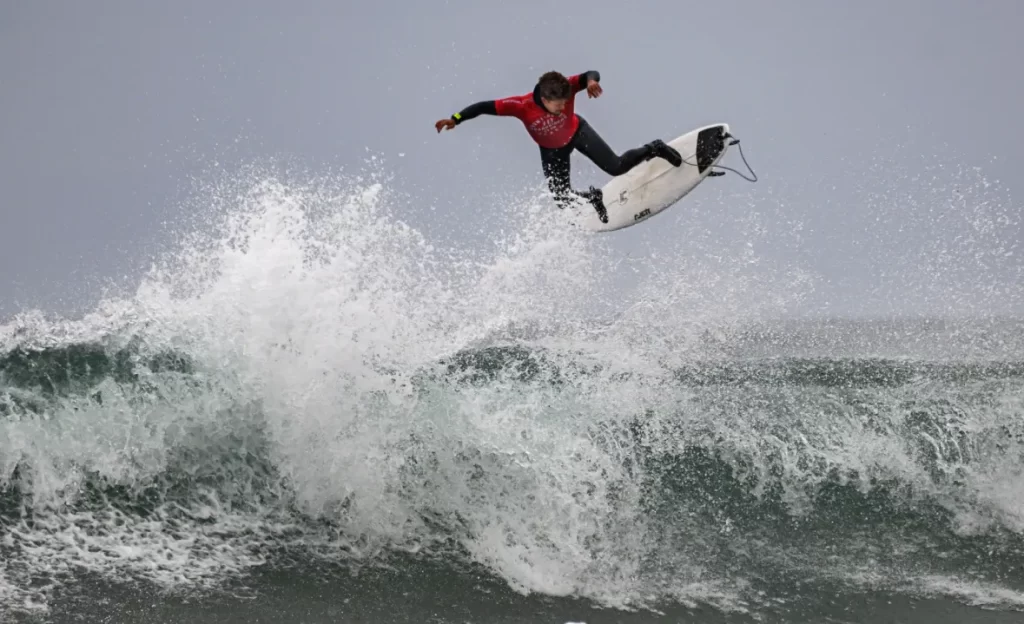Brandon Benjamin gets some air while competing in the Great Day in the Stoke surfing event in Huntington Beach on Saturday, June 4, 2022. (Photo by Mindy Schauer, Orange County Register/SCNG)
Nathan Fluellen has always been drawn to the water.
He started swimming at 10 months old and as a kid, even though he grew up far from the ocean in Chicago, he dreamed of one day riding waves, he said.
“But growing up, I didn’t see anyone who looked like me who surfed,” Fluellen said, hearing from others: “Black people don’t swim or surf.”
He’s setting out to erase those misconceptions, he said, and wants to show the next generation that the ocean and the sport he now holds dear are for everyone.

On Saturday, June 4, Fluellen organized A Great Day in the Stoke, a gathering that drew Black surfers together at the Huntington Beach Pier for a day of surf competition and lessons, beach yoga, music and surfboard demos – a mini festival to connect with one another and share space on the sand and in the sea.
“Consistently, I always hear, ‘You’re the first Black surfer I’ve ever met. I didn’t know Black people surf,’” Fluellen said. “I want people to see Black surfers, to know they exist. We want people to want to go out to surf.”
At the gathering, three pioneer Black surfers were honored: Tony Corley, founder of the Black Surfing Association; Sharon Schaffer, the first professional Black women surfer; and Kayiita Johnson, who started a social media page dedicated to Black surfers and their stories.
Fluellen’s own surf journey started when the TV host, who created the travel series “World Wide Nate,” wanted to do a documentary 11 years ago on the nonprofit Surfers Not Street Children in South Africa.
By then, he had moved from Chicago and was living in the Los Angeles area – closer to where his childhood dream of surfing could become a reality. So before his trip to Durban, South Africa, he learned to surf.
“With the show, I wanted to highlight that not only do Africans know how to swim, they know how to surf,” he said. “I’m a person who gets into the adventure and action. I couldn’t go to Durban and not surf.”
It was love at first wave, he said, everything he dreamed of as a kid. And when he got to surf with the kids in Africa, the connections he made in the water made him want to progress in the water.
“When I went to surf with the kids, their energy was so infectious – the joy,” he said. “I had to get better because I wanted to surf with them again.”
Surfing soon became an important part of his life, he said.
“It’s my opportunity to disconnect,” he said. “I’m unplugged in Mother Nature. The joy of catching a wave. You paddle, paddle and pop up, the adrenaline rush, that salt-water therapy.”
It was in 2020, when Fluellen said he saw a shift in the surf communities around the world, when countless surfers took a stand on the sand in protests following the deaths of George Floyd, Ahmad Aubrey and Brianna Taylor.
While it was great to see the surf community come together for the cause, Fluellen thought it would be great to also see each other not drawn together by tragedy, but with one simple goal: To have a good time.
“To celebrate our existence, our love of the sport and to come and meet each other,” he said. “This is an opportunity for the community to come together, give each other a hug. Those things have a lot of value.
“This is our opportunity to celebrate community and meet and grow the culture,” he said of Saturday’s festival. “What’s important is representation.”
Also helpful, he said, is that in recent years, more surf brands have been creating products for and are using imagery showcasing surfers from a variety of ethnic backgrounds, a veer from the past from when images of sun-kissed blondes made up most of the marketing and advertising.
“For the surf industry to see that there’s this demographic that exists and to invest into growing the sport,” he said. “That’s a whole economic base they can benefit from. People coming to Huntington Beach will spend money on food, gas and stimulate the economy.”
He started the first Black-focused swimwear line, Kavata, named in honor of his sister, Laini Kavata Fluellen, also a water lover, who died in 2009 from triple negative breast cancer. Ten percent of the proceeds go to a foundation his family created in her honor to raise funds for research and treatment.
But it’s not just the image or money that matter. Statistically, Black youth are five and half times more likely to drown, So teaching them water skills in imperative, he said.
“It’s always about saving lives. The more people who can swim, have better water safety, prevent people from drowning and not have a fear of the water,” he said. “And they can enjoy themselves.”

